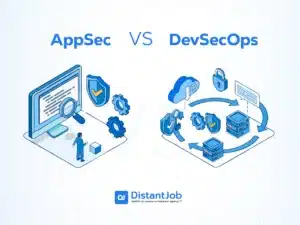Project management methodologies play an important role in keeping the project within all the crucial constraints like time, scope, and budget. The methods are specific to industries, business models, and, most importantly, the project itself.
Research shows that 37% of projects fail due to teams inadequately defining project goals. To avoid this, you need a well -defined project management methodology that can protect the project from uncertain events and unforeseen circumstances.
So, it’s your duty as a project manager to figure out which one works best for you and your project. In this article, we will learn about the different types of project management methodologies and help you decide on which one to use.
What is a Project Management Methodology?
A project management methodology is a set of principles, tools, and best practices that guide you in the course of planning, managing, and executing your project. They serve as a basic framework, pointing you to the right way of organizing your projects for optimum success.
Choosing the right project management methodology is the first step towards managing a project effectively and attaining success.
Types Of Project Management Methodologies
There are methodologies that have been specifically designed for use in software development, and others that have been created for other uses, but can easily be adapted to work for a development team.
General Project Management Methodologies
| Methodology | Best For | Not For |
| Agile | More complex projects | Slow-paced projects |
| CPM | Large projects with potential bottlenecks | Small or simple projects |
| Extreme Programming | Undefined Projects | Clearly specified projects with clear requirements |
| Kanban | Emphasising personal productivity | Large teams or complex processes |
| Lean | Process re-engineering | Fixed ways of working |
| PMBOK | Understanding Project Management | Established PMs |
| Prince2 | Larger projects or organizations | Small teams |
| Scrum | Small teams | Large projects |
| Six Sigma | Large organizations | Small businesses or startups |
| Waterfall | Highly structured projects. Easy onboarding. | Smaller projects or where a more responsive approach is needed |
10 Types of Project Management Methodologies
1. Waterfall Project Management
Waterfall project management methodology rests on the assumption that the progress of a project flows in one direction, like a waterfall. The methodology follows a step-by-step recipe in a sequential manner, where there is no going back to the former stage once it is completed.
The process include:
- Ascertaining requirements
- Analysis
- Design
- Construction
- Testing
- Deployment & maintenance.
For the Waterfall project management methodology to succeed, the assigned tasks must include every step that needs to be accomplished and arranged in a logical order.
If you adopt this technique as a project manager, then you agree that there is no room for last-minute changes. It’s a perfect project management methodology for projects with strict rules and tight budgets such as building an inventory management system for a small business.
However, it’s not ideal for spontaneous project tweaks.
When to use
You can use this project management methodology when your project needs a set plan with no surprises allowed. Great for those big projects with clear deliverables—everything needs to be crystal clear from the get-go.
2. Agile Project Management
Agile project management methodology is different as it involves breaking down projects into bite-sized chunks called iterations—no waiting until the finish line to make last time changes. With Agile, you adjust as you go, and the entire team must provide the stipulated deliverables.
The Agile project management methodology is built upon key principles of collaboration, quick execution, and openness to data-driven change. That’s why the methodology usually involve short phases of work with frequent testing, review, and other adaptations. The backlog keeps track of tasks, and priorities shift with each cycle.
Research reveals that companies that adopt project management methodology are more likely to enjoy customer satisfaction, better employee engagement, and improved operational performance. The methodology is perfect if you need to work quickly and complete tasks. You can also rely on Agile if you need to see speedy progress rather than perfect results.
When to use
When your project is a bit of a mystery, and you can’t plan every detail upfront, Agile is the way to go. It’s one of the best project management methodologies for IT projects such as software development where changes are virtually always present. Agile is also perfect if you plan on releasing a new product but are unaware of potential pain points until the project conclusion.
3. Scrum Project Management
Scrum is one form of Agile project management that works more like a framework than a project management methodology. It rests on the basis of sprinting to success, with work or project tasks split into short cycles known as “sprints” that last one to two weeks.
Scrum is designed for small teams led by a Scrum Master. The team leader tackles tasks from the backlog during each sprint after agreeing on deliverables. At the tail end, the team meets for a “sprint review” to fine-tune their approach and get feedback or suggestions for future work.
When to use
Scrum works best for small teams and is ideal for IT project management where quality is non-negotiable. It fits in any industry or organization craving flexibility. Larger teams may have trouble adapting Scrum as a project management methodology due to reasons such as:
- It can fail or be subject to scope creep
- It requires a fully engaged and committed team—which is a challenge for most large team players
4. Project Management Body of Knowledge (PMBOK)
PMBOK is a project management methodology crafted by the Project Management Institute and broken into five phases:
- Conception and initiation
- Planning
- Execution
- Performance and monitoring
- Closing.
The framework is considered valuable for companies as it helps them normalize practices across various departments. They can also be used to adapt processes to suit specific needs and prevent any project failures.
As a project manager, you can rely on PMBOK to familiarize yourself with the standardized project processes, the key guidelines, and best practices to use in project management. The framework contains the best practices that work on most projects.
When to use
Any project, big or small, can adopt the PMBOK methodology. It’s a project manager’s handbook that outlines the stages of a project’s life cycle and the key knowledge areas for successful management.
5. Kanban Methodology
Kanban project management methodology works by helping you visualize victory through the use of visual boards and cards. This methodology can best be termed as the billboard of your project management that helps teams see tasks that are complete, in progress, and outstanding.
Everything is visualized in a clear and effective manner, with a key focus on ongoing collaboration.
When to use
IT projects benefit much from the Kanban Methodology due to its clear visualization of the daily tasks and how it simplifies managing backlog. The methodology can also work on any project with a workflow that follows a predictable process, such as HR and marketing.
6. Critical Path Method (CPM)
The critical path method (CPM) is a methodology designed to help navigate the project maze by identifying all the essential tasks. As a project manager, you can rely on this methodology to build a project model, list all the tasks and durations, and milestones to be achieved.
On top of that, the methodology goes ahead to help you outline the longest sequence of critical activities to be completed so as to deliver the project on time.
When to use
It’s one of the most popular project management methodologies for small to mid-sized projects. You can use it on construction projects, software development, research projects, and product development. The methodology points you to the right direction, ensuring you don’t take a wrong turn down the critical path.
7. Critical Chain Project Management (CCPM)
CCPM methodology is all about managing a project based on the resources. These include all the teams, equipment, and space. Unlike other examples of project management methodologies that prioritize task order, CCPM focuses on resource balance and flexibility.
It assumes that resources might limit how well you run your project and therefore stresses their efficient utilization. The technique can make your projects 10-50% faster and more cost-effective if well implemented.
When to use
CCPM works for both large and small companies that want to manage their projects in a more cost efficient manner. It could be any type of a project—construction, IT project, etc.
8. Lean Methodology
Lean project management methodology is a framework that allows you to focus on delivering a project with more value and less waste. The idea is to maximize customer value while minimizing any waste—all by optimizing the flow of tasks and resources.
Based on the name Lean, the entire purpose of this methodology is centered on trimming anything unnecessary to create value. This is achieved through systematic waste reduction in the value stream.
The philosophy is that for a project to achieve greater results, it should be kept as lean as possible by working with fewer resources. Lean methodology originates from Toyota’s production line and has five guiding principles:
- Identifying value
- Mapping the value stream
- Creating continuous flow
- Establishing pull system
- Seeking perfection
When to use
Perfect for any project team aiming for maximum efficiency – whether you’re a startup, manufacturer, or software developer.
9. Six Sigma
Six Sigma is a project management methodology created by Motorola ’80s with a key focus on continuous improvement and defect elimination. It is a project management methodology strategically employed to enhance business processes through
- The reduction of defects and errors
- Minimization of variation
- Augmentation of overall quality and efficiency
The ultimate objective of Six Sigma is to attain a pinnacle of quality that approaches perfection. Six Sigma is often paired with the Agile framework or the Lean methodology, better known as Agile Six Sigma and Lean Six Sigma.
The six principles that define Six Sigma include:
- Focusing on what the customer wants
- Measuring the value stream and finding the problem
- Getting rid of waste
- Carrying on with your team
- Ensuring a flexible and responsive ecosystem
When to use
Six Sigma aligns well with large organizations that want to improve their efficiencies but cutting waste from the project. However, using it requires a certification.
10. Event Chain Methodology (ECM)
Event Chain Methodology for project management is a modeling technique based on uncertainties of the project. If you’re unsure about any potential event that could impact your project schedule, then this methodology is worth trying.
It’ll help you identify, analyze, and manage all those events at the time they happen. The six major principles that guide ECM include:
- Event chains
- Timing and status
- Critical events
- Mapping out the chain of events
- Monitoring the chain of events’ performance
- Quantifying the impact.
How To Choose the Right Project Management Methodology
When picking the right project management methodology, you’re banking on the hope that it’ll help you get to the desired end-goal. It makes the entire process of managing your project, no matter the scope or size smoother and more efficient.
Let’s explore ways you can choose the best project management methodologies for your project.
1. Test a Methodology with Small Projects
The best way to avoid unnecessary hitches down your project journey is to test different techniques on smaller, low-impact projects. This helps you figure out what clicks and what doesn’t, without risking too much.
2. Consider Flexibility of your Project
One question you need to ask before settling on any methodology is, does your project have a strict code? You want to have a clear view of what the project entails and whether there’s room for flexibility down the line.
3. Consider Project Size
Consider the size of your project and the dream team working on it. Larger projects might demand a methodology that can handle complexity, while smaller ones may benefit from a more straightforward approach.
4. Developer Personalities Matter
If you’re choosing a project management methodology for IT projects, then it’s vital to understand that the developers you work with aren’t just code machines.
They have various personalities where some thrive in structured environments, while others might prefer more creative freedom. Match the methodology to the people, not the other way around.
Time to Choose
We hope that the information above has given you some idea of which types of project management methodology might work for you and your team. The truth is that there is no one way, and it may take some trial and error to find the right methodology, and the right tools to use to implement it.
FAQ
Project management methodologies are unique sets of principles and practices that guide teams to plan, execute and complete a project.
Some of the common and popular project management methodologies include Agile, Scrum, and Kanban. They are both suited to different types of projects.
Project lifecycle models outline the phases a project goes through from inception to completion. The models provide a roadmap for the project journey ahead.




